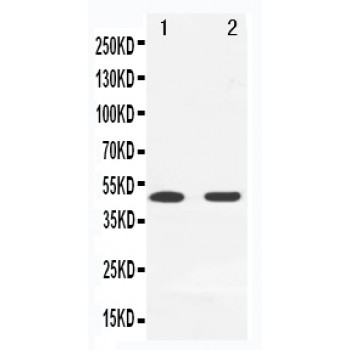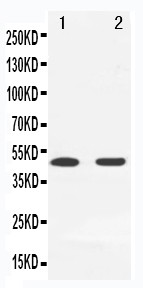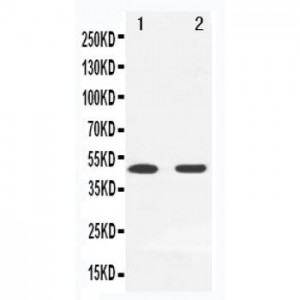More info
Overview
Long Name | Antibody Type | Antibody Isotype | Host | Species Reactivity | Validated Applications | Purification |
| mitogen-activated protein kinase kinase 7 | Polyclonal | IgG | Rabbit | Human, Mouse, Rat | WB | Immunogen affinity purified. |
Immunogen | ||||||
| A synthetic peptide corresponding to a sequence at the N-terminus of human MEK7(24-40aa ARRRIDLNLDISPQRPR), identical to the related rat and mouse sequences. | ||||||
Properties
Form | Lyophilized |
Size | 100 µg/vial |
Contents | Antibody is lyophilized with 5 mg BSA, 0.9 mg NaCl, 0.2 mg Na2HPO4, 0.05 mg Thimerosal and 0.05 mg NaN3. *carrier free antibody available upon request. |
Concentration | Reconstitute with 0.2 mL sterile dH2O (500 µg/ml final concentration). |
Storage | At -20 °C for 12 months, as supplied. Store reconstituted antibody at 2-8 °C for one month. For long-term storage, aliquot and store at -20 °C. Avoid repeated freezing and thawing. |
Additional Information Regarding the Antigen
Gene | MAP2K7 |
Protein | Dual specificity mitogen-activated protein kinase kinase 7 |
Uniprot ID | O14733 |
Function | Dual specificity protein kinase which acts as an essential component of the MAP kinase signal transduction pathway. Essential component of the stress-activated protein kinase/c-Jun N-terminal kinase (SAP/JNK) signaling pathway. With MAP2K4/MKK4, is the one of the only known kinase to directly activate the stress-activated protein kinase/c-Jun N-terminal kinases MAPK8/JNK1, MAPK9/JNK2 and MAPK10/JNK3. MAP2K4/MKK4 and MAP2K7/MKK7 both activate the JNKs by phosphorylation, but they differ in their preference for the phosphorylation site in the Thr-Pro-Tyr motif. MAP2K4/MKK4 shows preference for phosphorylation of the Tyr residue and MAP2K7/MKK7 for the Thr residue. The monophosphorylation of JNKs on the Thr residue is sufficient to increase JNK activity indicating that MAP2K7/MKK7 is important to trigger JNK activity, while the additional phosphorylation of the Tyr residue by MAP2K4/MKK4 ensures optimal JNK activation. Has a specific role in JNK signal transduction pathway activated by proinflammatory cytokines. The MKK/JNK signaling pathway is also involved in mitochondrial death signaling pathway, including the release cytochrome c, leading to apoptosis. |
Tissue Specificity | Ubiquitous; with highest level of expression in skeletal muscle. Isoform 3 is found at low levels in placenta, fetal liver, and skeletal muscle. |
Sub-cellular localization | Nucleus. Cytoplasm . |
Sequence Similarities | Belongs to the protein kinase superfamily. STE Ser/Thr protein kinase family. MAP kinase kinase subfamily. |
Aliases | c Jun N terminal kinase kinase 2 antibody|c-Jun N-terminal kinase kinase 2 antibody|Dual specificity mitogen activated protein kinase kinase 7 antibody|Dual specificity mitogen-activated protein kinase kinase 7 antibody|JNK activating kinase 2 antibody|JNK kinase 2 antibody|JNK-activating kinase 2 antibody|JNKK 2 antibody|Jnkk-2 antibody|Jnkk2 antibody|MAP kinase kinase 7 antibody|MAP2K 7 antibody|MAP2K7 antibody|MAPK/ERK kinase 7 antibody|MAPKK 7 antibody|MAPKK-7 antibody|MAPKK7 antibody|MEK 7 antibody|Mitogen activated protein kinase kinase 7 antibody|MKK 7 antibody|MKK-7 antibody|MKK7 antibody|MP2K7_HUMAN antibody|PRKMK 7 antibody|PRKMK-7 antibody|PRKMK7 antibody|Protein kinase mitogen activated kinase 7 antibody|Sek 2 antibody|Sek-2 antibody|Sek2 antibody|SKK4 antibody |
Application Details
| Application | Concentration* | Species | Validated Using** |
| Western blot | 0.1-0.5μg/ml | Human, Rat Mouse | AssaySolutio's ECL kit |
AssaySolution recommends Rabbit Chemiluminescent WB Detection Kit (AKIT001B) for Western blot. *Blocking peptide can be purchased at $65. Contact us for more information

Anti-MEK7 antibody, ASA-B1258, Western blotting
Lane 1: Rat Spleen Tissue Lysate
Lane 2: Rat Brain Tissue Lysate
Lane 1: Rat Spleen Tissue Lysate
Lane 2: Rat Brain Tissue Lysate



